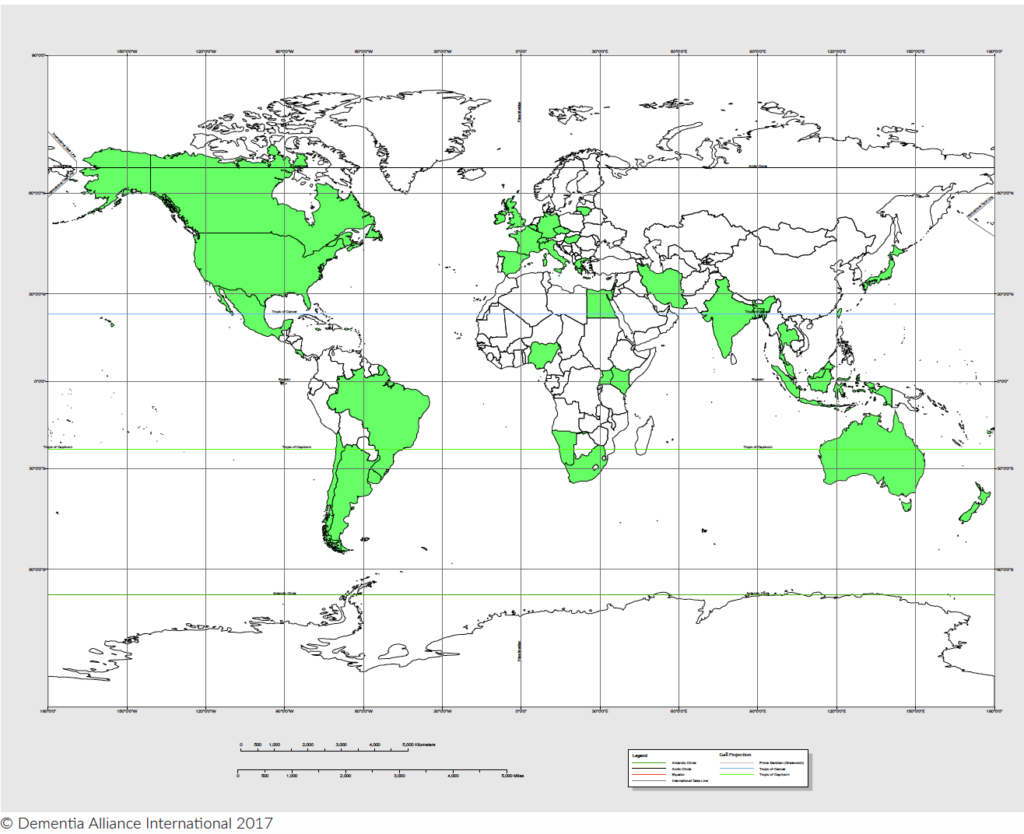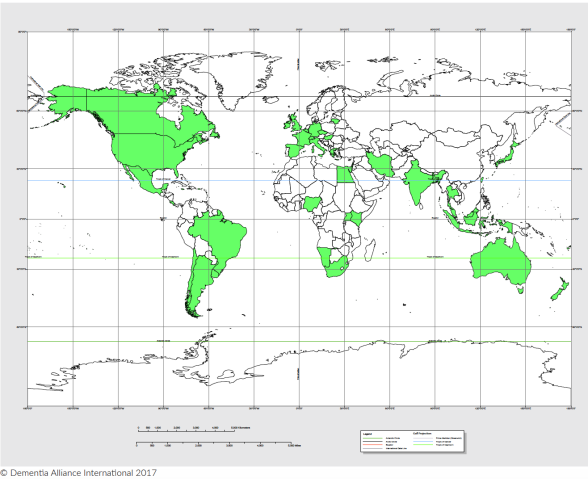 DAI Membership Map
DAI Membership MapWhere in the world is DAI?
Well, almost everywhere. We have members in 49 different, and a great many are very busy locally, nationally and internationally.
DAI members attend meetings and events at the United Nations in New York and Geneva, the World Health Organisation in Geneva, and meetings or specific advocacy events in Lausanne, Washington, Sydney, Canberra, London, and quite literally, cities and towns all over the world. There are simply too many to list!
The voices of all people impacted by dementia matter, and our advocacy, and for some, activism is important and is increasing, both in terms of the numbers of people with dementia and/or their families becoming involved, and the 'volume' of our voices.
We are being heard, but little has changed:
- People with dementia are still being advised to 'get their end of life affairs in order', and offered little if any support to live positively and independently, for as long as possible.
- The style of language being used in all forms of the media remains persistently negative, disabling and disrespectful; there has been little change in terms of language in the clinical and academic sectors either.
- Researchers and health care professionals still do not manage dementia as a condition causing cognitive and other disabilites, many even insisting on th medical model of post diagnostic care. This is in spite of the fact that the World Health Organisation Factsheets on Dementia have stated for some years now that "Dementia is a major cause of disability and dependnce in older persons."
- People with dementia are still not provided with disability assessment or support soon after diagnosis.
- Our human rights are being ignored, and full and equal access to the UN CRPD as person with disabilities are still not being realised.
- People with dementia continue to be physically and chemical restrained in nursing homes. The 2018 Human Rights Watch report on this in the USA is deeply distressing.
- Neglect and abuse within nursing homes, and also in the community is still high.
- Elder abuse is still especially present.
- When talking to people more recently diagnosed with dementia, it is clear the Dementia Friendly initiatives have done little to change what happens for them at the time of diagnosis, or after. In the broader context of civil society including health care professionals, they have rarely changed attitudes, and have barely, if at all, decreased the stigma or discrimination still being experienced.
Attitudes to dementia have not changed
In the recent ADI World Alzheimer's Report on Attitudes to dementia, some of the key findings of the report include:
- Almost 80% of the general public are concerned about developing dementia at some point and 1 in 4 people think that there is nothing we can do to prevent dementia.
- 35% of carers across the world said that they have hidden the diagnosis of dementia of a family member.
- Over 50% of carers globally say their health has suffered as a result of their caring responsibilities even whilst expressing positive sentiments about their role.
- Almost 62% of healthcare providers worldwide think that dementia is part of normal ageing.
- 40% of the general public think doctors and nurses ignore people with dementia.
These findings, in particular number 4, are deeply disturbing, and are likely a further indication of the lack of tangible impact of advocacy.
So, if dementia advocates keep doing what has always done, and keep getting the same results, unless WE change, nothing will change. As a prominent care partner Jayne Roberts said last year, "Everything has changed, and nothing has changed."
As advocates, we need to re-asses our plan(s) of action.
Perhaps one of the key factors in why very litttle has changed, epecially for newly diagosed peopel with dementia, may be that we should ALL be working together more collaborativley, with each other, both individually and between organisations.
The challenge with that of course, is that many organisations and many individuals have differing agendas, or are more concerned about funding. Of course, funding for all organisations is very necessary, but it is not yet adequately helping people diagnosed with dementia, or our families.
